Analysis of Complex Project Management: Climate Change Control
VerifiedAdded on 2023/01/11
|6
|1551
|74
Report
AI Summary
This report delves into the complexities of managing climate change control projects, identifying them as "wicked problems" due to factors like uncertainty, ambiguity, ill-defined solutions, and stakeholder disagreements. The report analyzes these challenges within the context of the Kyoto Protocol, IPCC recommendations, and various stakeholder perspectives, including governmental bodies and industrial sectors. It highlights the need for specialized complex project management approaches, emphasizing the importance of knowledge management, systematic approaches, and agile frameworks to address the multifaceted nature of climate change initiatives. The report recommends practices such as the implementation of knowledge management practices, systematic governance, and agile methodologies to improve the quality of action implementation and the overall effectiveness of climate change control efforts. The conclusion reinforces the significance of these strategies for managing the wicked problem of climate change and ensuring a sustainable future.
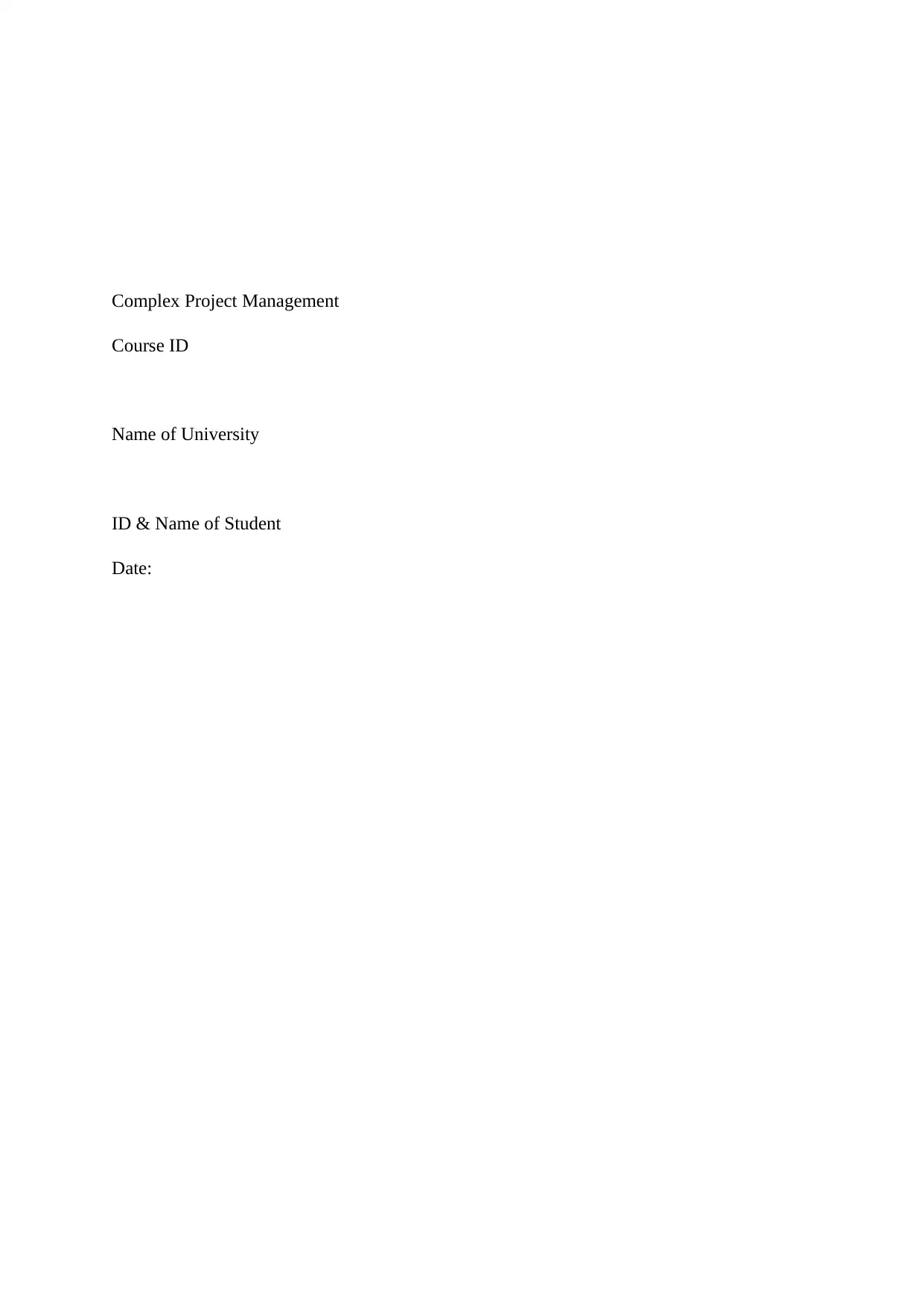
Complex Project Management
Course ID
Name of University
ID & Name of Student
Date:
Course ID
Name of University
ID & Name of Student
Date:
Paraphrase This Document
Need a fresh take? Get an instant paraphrase of this document with our AI Paraphraser

2
Table of Contents
1. Introduction............................................................................................................................3
2. Context...................................................................................................................................3
3. Recommendation....................................................................................................................5
4. Conclusion..............................................................................................................................5
References..................................................................................................................................5
Table of Contents
1. Introduction............................................................................................................................3
2. Context...................................................................................................................................3
3. Recommendation....................................................................................................................5
4. Conclusion..............................................................................................................................5
References..................................................................................................................................5
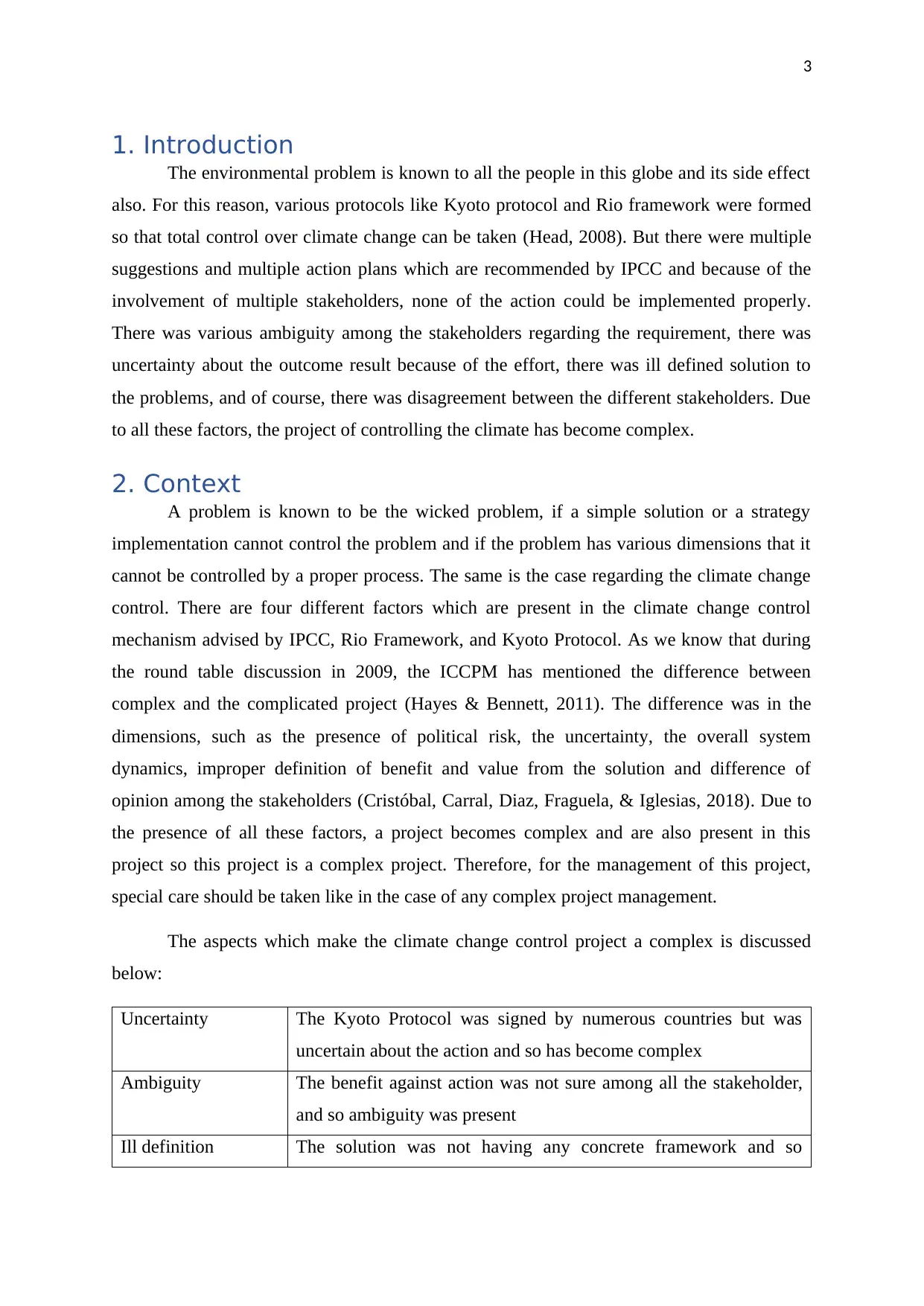
3
1. Introduction
The environmental problem is known to all the people in this globe and its side effect
also. For this reason, various protocols like Kyoto protocol and Rio framework were formed
so that total control over climate change can be taken (Head, 2008). But there were multiple
suggestions and multiple action plans which are recommended by IPCC and because of the
involvement of multiple stakeholders, none of the action could be implemented properly.
There was various ambiguity among the stakeholders regarding the requirement, there was
uncertainty about the outcome result because of the effort, there was ill defined solution to
the problems, and of course, there was disagreement between the different stakeholders. Due
to all these factors, the project of controlling the climate has become complex.
2. Context
A problem is known to be the wicked problem, if a simple solution or a strategy
implementation cannot control the problem and if the problem has various dimensions that it
cannot be controlled by a proper process. The same is the case regarding the climate change
control. There are four different factors which are present in the climate change control
mechanism advised by IPCC, Rio Framework, and Kyoto Protocol. As we know that during
the round table discussion in 2009, the ICCPM has mentioned the difference between
complex and the complicated project (Hayes & Bennett, 2011). The difference was in the
dimensions, such as the presence of political risk, the uncertainty, the overall system
dynamics, improper definition of benefit and value from the solution and difference of
opinion among the stakeholders (Cristóbal, Carral, Diaz, Fraguela, & Iglesias, 2018). Due to
the presence of all these factors, a project becomes complex and are also present in this
project so this project is a complex project. Therefore, for the management of this project,
special care should be taken like in the case of any complex project management.
The aspects which make the climate change control project a complex is discussed
below:
Uncertainty The Kyoto Protocol was signed by numerous countries but was
uncertain about the action and so has become complex
Ambiguity The benefit against action was not sure among all the stakeholder,
and so ambiguity was present
Ill definition The solution was not having any concrete framework and so
1. Introduction
The environmental problem is known to all the people in this globe and its side effect
also. For this reason, various protocols like Kyoto protocol and Rio framework were formed
so that total control over climate change can be taken (Head, 2008). But there were multiple
suggestions and multiple action plans which are recommended by IPCC and because of the
involvement of multiple stakeholders, none of the action could be implemented properly.
There was various ambiguity among the stakeholders regarding the requirement, there was
uncertainty about the outcome result because of the effort, there was ill defined solution to
the problems, and of course, there was disagreement between the different stakeholders. Due
to all these factors, the project of controlling the climate has become complex.
2. Context
A problem is known to be the wicked problem, if a simple solution or a strategy
implementation cannot control the problem and if the problem has various dimensions that it
cannot be controlled by a proper process. The same is the case regarding the climate change
control. There are four different factors which are present in the climate change control
mechanism advised by IPCC, Rio Framework, and Kyoto Protocol. As we know that during
the round table discussion in 2009, the ICCPM has mentioned the difference between
complex and the complicated project (Hayes & Bennett, 2011). The difference was in the
dimensions, such as the presence of political risk, the uncertainty, the overall system
dynamics, improper definition of benefit and value from the solution and difference of
opinion among the stakeholders (Cristóbal, Carral, Diaz, Fraguela, & Iglesias, 2018). Due to
the presence of all these factors, a project becomes complex and are also present in this
project so this project is a complex project. Therefore, for the management of this project,
special care should be taken like in the case of any complex project management.
The aspects which make the climate change control project a complex is discussed
below:
Uncertainty The Kyoto Protocol was signed by numerous countries but was
uncertain about the action and so has become complex
Ambiguity The benefit against action was not sure among all the stakeholder,
and so ambiguity was present
Ill definition The solution was not having any concrete framework and so
⊘ This is a preview!⊘
Do you want full access?
Subscribe today to unlock all pages.

Trusted by 1+ million students worldwide
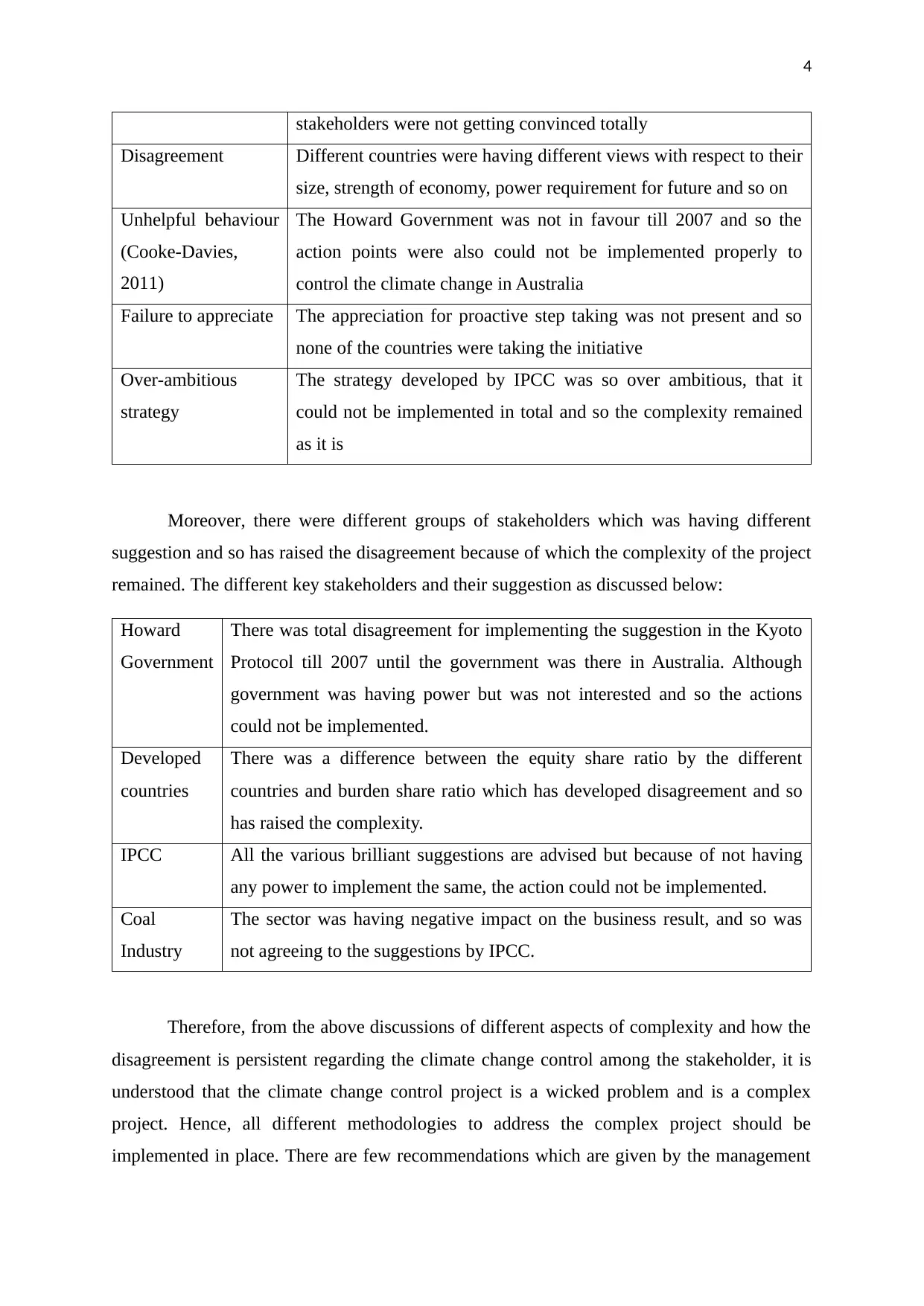
4
stakeholders were not getting convinced totally
Disagreement Different countries were having different views with respect to their
size, strength of economy, power requirement for future and so on
Unhelpful behaviour
(Cooke-Davies,
2011)
The Howard Government was not in favour till 2007 and so the
action points were also could not be implemented properly to
control the climate change in Australia
Failure to appreciate The appreciation for proactive step taking was not present and so
none of the countries were taking the initiative
Over-ambitious
strategy
The strategy developed by IPCC was so over ambitious, that it
could not be implemented in total and so the complexity remained
as it is
Moreover, there were different groups of stakeholders which was having different
suggestion and so has raised the disagreement because of which the complexity of the project
remained. The different key stakeholders and their suggestion as discussed below:
Howard
Government
There was total disagreement for implementing the suggestion in the Kyoto
Protocol till 2007 until the government was there in Australia. Although
government was having power but was not interested and so the actions
could not be implemented.
Developed
countries
There was a difference between the equity share ratio by the different
countries and burden share ratio which has developed disagreement and so
has raised the complexity.
IPCC All the various brilliant suggestions are advised but because of not having
any power to implement the same, the action could not be implemented.
Coal
Industry
The sector was having negative impact on the business result, and so was
not agreeing to the suggestions by IPCC.
Therefore, from the above discussions of different aspects of complexity and how the
disagreement is persistent regarding the climate change control among the stakeholder, it is
understood that the climate change control project is a wicked problem and is a complex
project. Hence, all different methodologies to address the complex project should be
implemented in place. There are few recommendations which are given by the management
stakeholders were not getting convinced totally
Disagreement Different countries were having different views with respect to their
size, strength of economy, power requirement for future and so on
Unhelpful behaviour
(Cooke-Davies,
2011)
The Howard Government was not in favour till 2007 and so the
action points were also could not be implemented properly to
control the climate change in Australia
Failure to appreciate The appreciation for proactive step taking was not present and so
none of the countries were taking the initiative
Over-ambitious
strategy
The strategy developed by IPCC was so over ambitious, that it
could not be implemented in total and so the complexity remained
as it is
Moreover, there were different groups of stakeholders which was having different
suggestion and so has raised the disagreement because of which the complexity of the project
remained. The different key stakeholders and their suggestion as discussed below:
Howard
Government
There was total disagreement for implementing the suggestion in the Kyoto
Protocol till 2007 until the government was there in Australia. Although
government was having power but was not interested and so the actions
could not be implemented.
Developed
countries
There was a difference between the equity share ratio by the different
countries and burden share ratio which has developed disagreement and so
has raised the complexity.
IPCC All the various brilliant suggestions are advised but because of not having
any power to implement the same, the action could not be implemented.
Coal
Industry
The sector was having negative impact on the business result, and so was
not agreeing to the suggestions by IPCC.
Therefore, from the above discussions of different aspects of complexity and how the
disagreement is persistent regarding the climate change control among the stakeholder, it is
understood that the climate change control project is a wicked problem and is a complex
project. Hence, all different methodologies to address the complex project should be
implemented in place. There are few recommendations which are given by the management
Paraphrase This Document
Need a fresh take? Get an instant paraphrase of this document with our AI Paraphraser
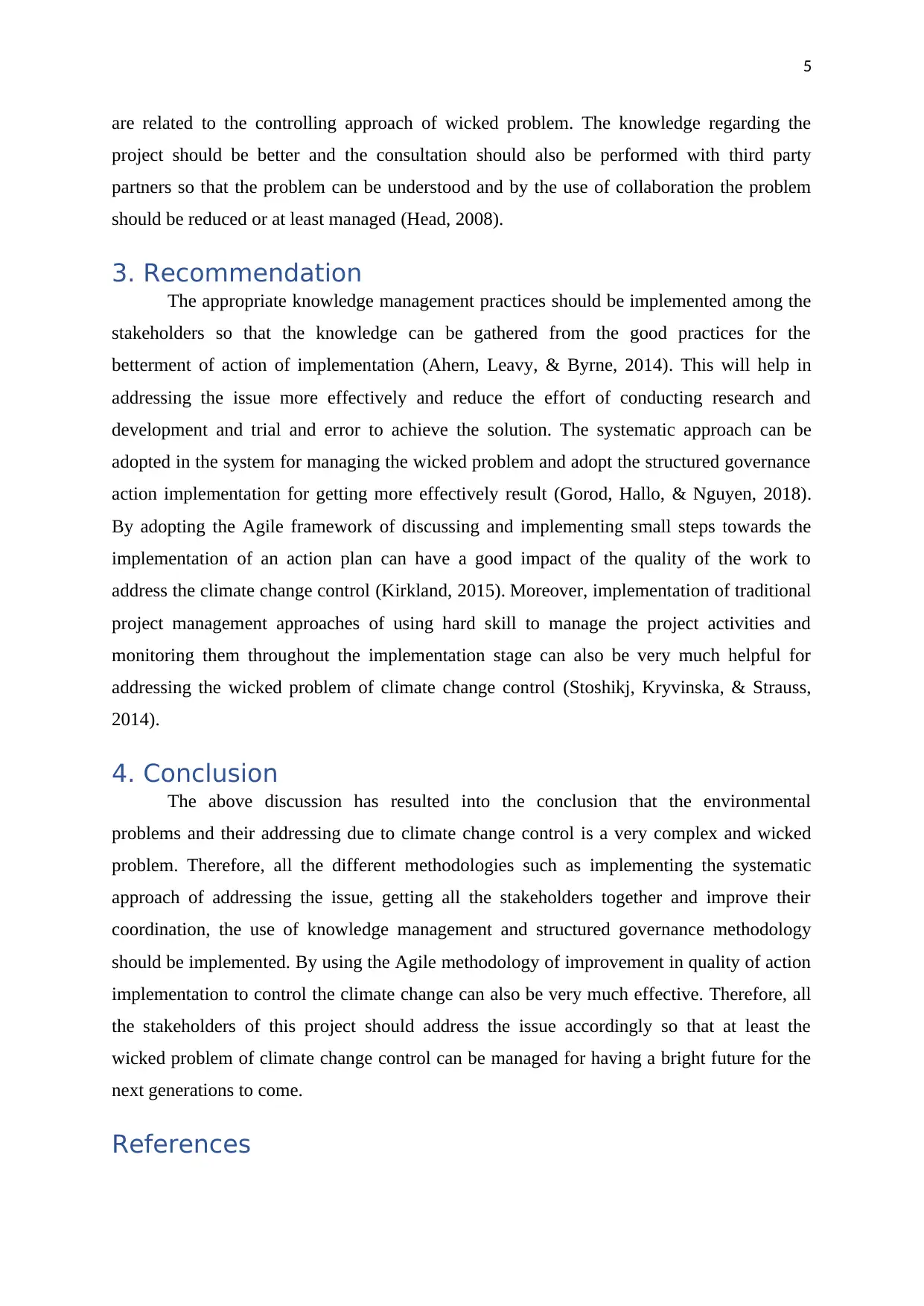
5
are related to the controlling approach of wicked problem. The knowledge regarding the
project should be better and the consultation should also be performed with third party
partners so that the problem can be understood and by the use of collaboration the problem
should be reduced or at least managed (Head, 2008).
3. Recommendation
The appropriate knowledge management practices should be implemented among the
stakeholders so that the knowledge can be gathered from the good practices for the
betterment of action of implementation (Ahern, Leavy, & Byrne, 2014). This will help in
addressing the issue more effectively and reduce the effort of conducting research and
development and trial and error to achieve the solution. The systematic approach can be
adopted in the system for managing the wicked problem and adopt the structured governance
action implementation for getting more effectively result (Gorod, Hallo, & Nguyen, 2018).
By adopting the Agile framework of discussing and implementing small steps towards the
implementation of an action plan can have a good impact of the quality of the work to
address the climate change control (Kirkland, 2015). Moreover, implementation of traditional
project management approaches of using hard skill to manage the project activities and
monitoring them throughout the implementation stage can also be very much helpful for
addressing the wicked problem of climate change control (Stoshikj, Kryvinska, & Strauss,
2014).
4. Conclusion
The above discussion has resulted into the conclusion that the environmental
problems and their addressing due to climate change control is a very complex and wicked
problem. Therefore, all the different methodologies such as implementing the systematic
approach of addressing the issue, getting all the stakeholders together and improve their
coordination, the use of knowledge management and structured governance methodology
should be implemented. By using the Agile methodology of improvement in quality of action
implementation to control the climate change can also be very much effective. Therefore, all
the stakeholders of this project should address the issue accordingly so that at least the
wicked problem of climate change control can be managed for having a bright future for the
next generations to come.
References
are related to the controlling approach of wicked problem. The knowledge regarding the
project should be better and the consultation should also be performed with third party
partners so that the problem can be understood and by the use of collaboration the problem
should be reduced or at least managed (Head, 2008).
3. Recommendation
The appropriate knowledge management practices should be implemented among the
stakeholders so that the knowledge can be gathered from the good practices for the
betterment of action of implementation (Ahern, Leavy, & Byrne, 2014). This will help in
addressing the issue more effectively and reduce the effort of conducting research and
development and trial and error to achieve the solution. The systematic approach can be
adopted in the system for managing the wicked problem and adopt the structured governance
action implementation for getting more effectively result (Gorod, Hallo, & Nguyen, 2018).
By adopting the Agile framework of discussing and implementing small steps towards the
implementation of an action plan can have a good impact of the quality of the work to
address the climate change control (Kirkland, 2015). Moreover, implementation of traditional
project management approaches of using hard skill to manage the project activities and
monitoring them throughout the implementation stage can also be very much helpful for
addressing the wicked problem of climate change control (Stoshikj, Kryvinska, & Strauss,
2014).
4. Conclusion
The above discussion has resulted into the conclusion that the environmental
problems and their addressing due to climate change control is a very complex and wicked
problem. Therefore, all the different methodologies such as implementing the systematic
approach of addressing the issue, getting all the stakeholders together and improve their
coordination, the use of knowledge management and structured governance methodology
should be implemented. By using the Agile methodology of improvement in quality of action
implementation to control the climate change can also be very much effective. Therefore, all
the stakeholders of this project should address the issue accordingly so that at least the
wicked problem of climate change control can be managed for having a bright future for the
next generations to come.
References
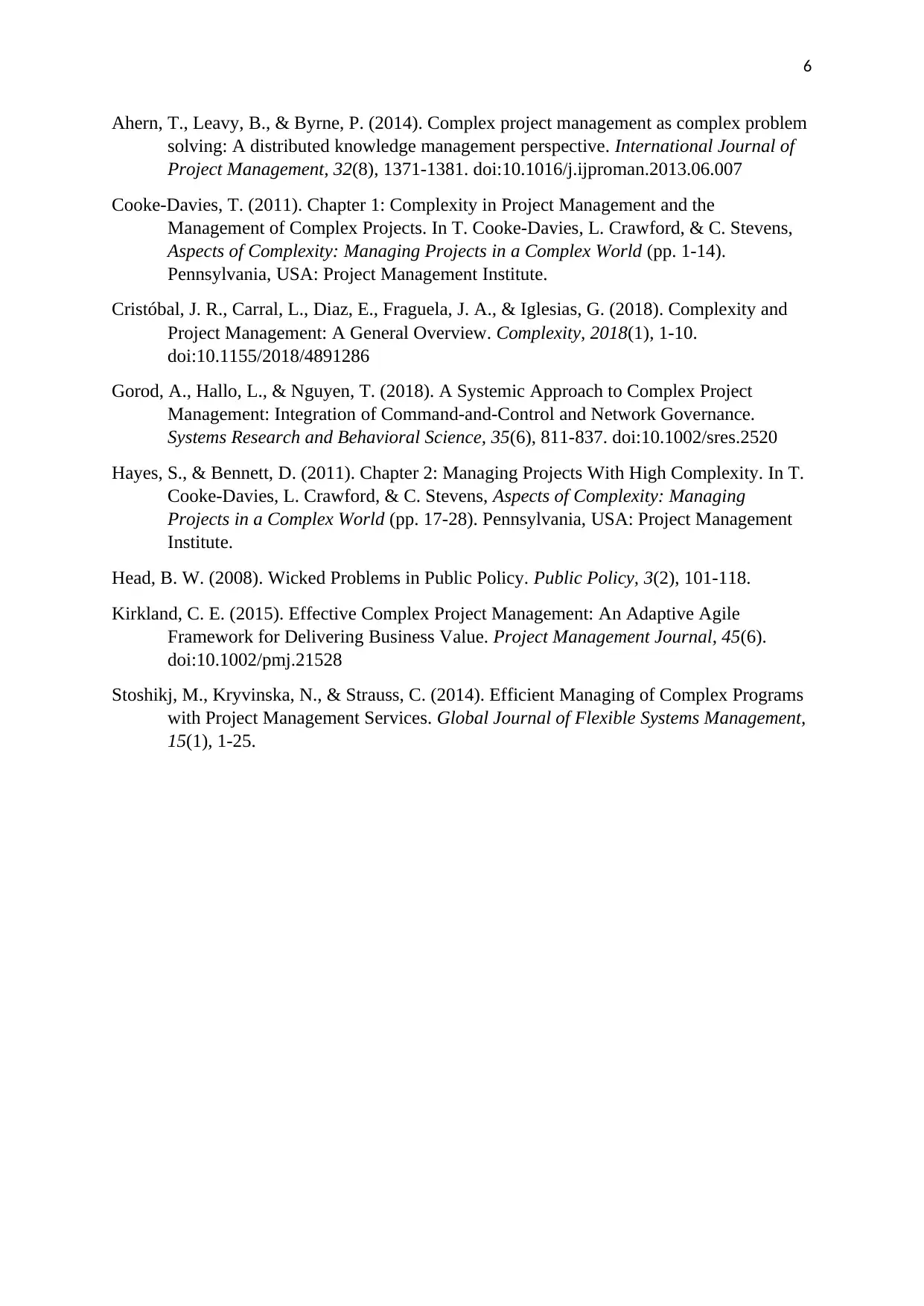
6
Ahern, T., Leavy, B., & Byrne, P. (2014). Complex project management as complex problem
solving: A distributed knowledge management perspective. International Journal of
Project Management, 32(8), 1371-1381. doi:10.1016/j.ijproman.2013.06.007
Cooke-Davies, T. (2011). Chapter 1: Complexity in Project Management and the
Management of Complex Projects. In T. Cooke-Davies, L. Crawford, & C. Stevens,
Aspects of Complexity: Managing Projects in a Complex World (pp. 1-14).
Pennsylvania, USA: Project Management Institute.
Cristóbal, J. R., Carral, L., Diaz, E., Fraguela, J. A., & Iglesias, G. (2018). Complexity and
Project Management: A General Overview. Complexity, 2018(1), 1-10.
doi:10.1155/2018/4891286
Gorod, A., Hallo, L., & Nguyen, T. (2018). A Systemic Approach to Complex Project
Management: Integration of Command‐and‐Control and Network Governance.
Systems Research and Behavioral Science, 35(6), 811-837. doi:10.1002/sres.2520
Hayes, S., & Bennett, D. (2011). Chapter 2: Managing Projects With High Complexity. In T.
Cooke-Davies, L. Crawford, & C. Stevens, Aspects of Complexity: Managing
Projects in a Complex World (pp. 17-28). Pennsylvania, USA: Project Management
Institute.
Head, B. W. (2008). Wicked Problems in Public Policy. Public Policy, 3(2), 101-118.
Kirkland, C. E. (2015). Effective Complex Project Management: An Adaptive Agile
Framework for Delivering Business Value. Project Management Journal, 45(6).
doi:10.1002/pmj.21528
Stoshikj, M., Kryvinska, N., & Strauss, C. (2014). Efficient Managing of Complex Programs
with Project Management Services. Global Journal of Flexible Systems Management,
15(1), 1-25.
Ahern, T., Leavy, B., & Byrne, P. (2014). Complex project management as complex problem
solving: A distributed knowledge management perspective. International Journal of
Project Management, 32(8), 1371-1381. doi:10.1016/j.ijproman.2013.06.007
Cooke-Davies, T. (2011). Chapter 1: Complexity in Project Management and the
Management of Complex Projects. In T. Cooke-Davies, L. Crawford, & C. Stevens,
Aspects of Complexity: Managing Projects in a Complex World (pp. 1-14).
Pennsylvania, USA: Project Management Institute.
Cristóbal, J. R., Carral, L., Diaz, E., Fraguela, J. A., & Iglesias, G. (2018). Complexity and
Project Management: A General Overview. Complexity, 2018(1), 1-10.
doi:10.1155/2018/4891286
Gorod, A., Hallo, L., & Nguyen, T. (2018). A Systemic Approach to Complex Project
Management: Integration of Command‐and‐Control and Network Governance.
Systems Research and Behavioral Science, 35(6), 811-837. doi:10.1002/sres.2520
Hayes, S., & Bennett, D. (2011). Chapter 2: Managing Projects With High Complexity. In T.
Cooke-Davies, L. Crawford, & C. Stevens, Aspects of Complexity: Managing
Projects in a Complex World (pp. 17-28). Pennsylvania, USA: Project Management
Institute.
Head, B. W. (2008). Wicked Problems in Public Policy. Public Policy, 3(2), 101-118.
Kirkland, C. E. (2015). Effective Complex Project Management: An Adaptive Agile
Framework for Delivering Business Value. Project Management Journal, 45(6).
doi:10.1002/pmj.21528
Stoshikj, M., Kryvinska, N., & Strauss, C. (2014). Efficient Managing of Complex Programs
with Project Management Services. Global Journal of Flexible Systems Management,
15(1), 1-25.
⊘ This is a preview!⊘
Do you want full access?
Subscribe today to unlock all pages.

Trusted by 1+ million students worldwide
1 out of 6
Your All-in-One AI-Powered Toolkit for Academic Success.
+13062052269
info@desklib.com
Available 24*7 on WhatsApp / Email
![[object Object]](/_next/static/media/star-bottom.7253800d.svg)
Unlock your academic potential
Copyright © 2020–2026 A2Z Services. All Rights Reserved. Developed and managed by ZUCOL.
